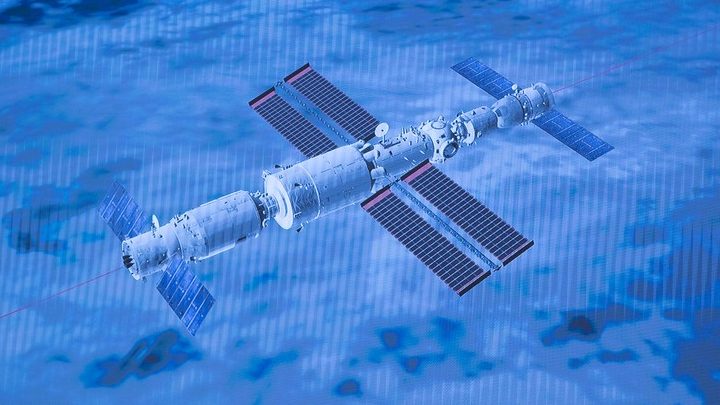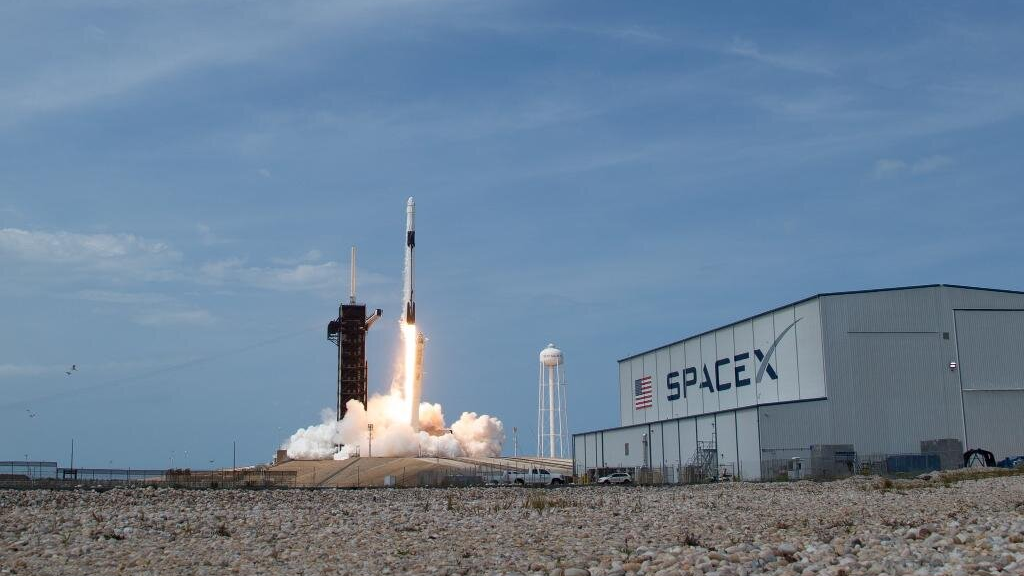
Screen image captured at Beijing Aerospace Control Center shows China's Shenzhou-12 manned spaceship having successfully docked with the space station core module Tianhe, June 17, 2021. /Xinhua
Screen image captured at Beijing Aerospace Control Center shows China's Shenzhou-12 manned spaceship having successfully docked with the space station core module Tianhe, June 17, 2021. /Xinhua
Editor's note: Anthony Moretti is an associate professor at the Department of Communication and Organizational Leadership of Robert Morris University. The article reflects the author's views and not necessarily those of CGTN.
It is inevitable: A country that fears another on Earth also will fear it in space.
So, here we are.
Within hours of China successfully launching a three-man crew into space, where they will spend three months at China's space station that remains under construction, the White House began issuing its latest set of warnings that if China cannot be trusted down here on Earth, well, then it cannot be trusted up there in space either.
As the Washington Post reported, Bill Nelson, who is the U.S. President Joe Biden's top NASA official, said China is "a very aggressive competitor" and is putting a real effort into challenging America's dominance in outer space. To make sure everyone understood what he meant, Nelson added: "Watch the Chinese."
Nelson's comments must have brought a smile to Sen. Angus King's face. King is a Republican from Maine who bemoaned China landing its own rover on Mars last month. "This landing reinforces the point that we don't own space anymore," he said then.
Anyone who examines U.S. history records will never find any paperwork indicating America ever owned space. And with good reason: It never did, and it never will. The same goes for Russia, Japan, China, and any European nation that has been active in space exploration. Outer space belongs to no country. However, the exploration of it -- no matter the country undertaking that mission -- stands to benefit all of humanity.
Learning more about the other planets and outer space, in general, is very much part of the concept of a community with a shared future. Unfortunately, the political elites in the U.S. are motivated by fear, not enthusiasm, when it comes to sharing outer space with China.
Remember that Sen. King's aforementioned remarks came as the Senate was debating the controversial United States Innovation and Competition Act (USICA), which the Senate ultimately passed a couple of weeks ago. As just one reminder of the anti-China rhetoric and narrative baked into the USICA, it sets aside more than $1 billion to "counter the malign influences of the Chinese Communist Party."
It is a sad commentary that the political elite in the United States right now firmly believes any advance China makes -- on Earth or in space -- cannot be viewed as anything but a threat to American hegemony.

NASA is pushing to return to the moon with the Artemis program, which aims to establish a permanent base on the lunar surface by the end of the decade. /Getty
NASA is pushing to return to the moon with the Artemis program, which aims to establish a permanent base on the lunar surface by the end of the decade. /Getty
That negative mindset alone would be enough to end any talk of some kind of joint China-U.S. space mission. But even if by some miracle the idea of a shared mission began percolating in the national conversation, another problem would arise: current U.S. law prohibits the two countries from working together on space exploration.
NASA's deputy administrator believes that the law ought not to be changed. [NASA deputy administrator and former astronaut] Pam Melroy told a Senate committee last month, "China has made their goals very clear --to take away space superiority from the United States."
At least she was smart enough not to claim the U.S. literally owned space.
This week, while the political class was delivering its usual messages of friction and conflict as the Chinese crew joined the country's developing space station, some people outside of government were spinning a different message.
Brian Weeden is a top official at the Secure World Foundation, which advocates for the "peaceful uses of space benefiting Earth and all its peoples." Asked by the Washington Post about China's mission, Weeden said, "China is trying to use its space station to show that it, too, is a space power."
Jonathan McDowell is an astronomer at the Harvard and Smithsonian Center for Astrophysics. He said he was looking forward to seeing how the complexity of the Chinese mission played out. "They're going, from day one, all in to be much more aggressive in their use of this space station," he said.
At the moment, the International Space Station (ISS) -- which is primarily operated by the U.S., Russia, and a few other nations -- stands a real chance of being shut down in 2-3 years. If that were to happen, China would have an exclusive domain in space.
That reality must send shivers down the spines of many U.S. politicians. Yet, they have not done what NASA wants: hand the space agency more than $3 billion to rapidly advance plans to send a U.S. crew to the moon. A hoped-for 2024 mission is not going to happen, and it seems unlikely -- at least right now -- that the U.S. would venture to the moon until perhaps 2028.
Of course, the more successes China has meant, the more anxiety there will be in Washington. And that could lead to irrational spending just to prove to the Chinese that America still "owns" space.
There is a cliché in the U.S. that states "slow and steady wins the race." When it comes to space exploration, those words need to be edited to state, "China is slowly and steadily advancing in space with no desire for a space race." More people need to recognize that.
(If you want to contribute and have specific expertise, please contact us at opinions@cgtn.com.)

